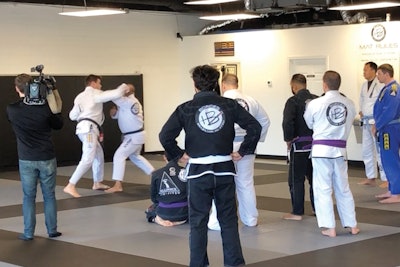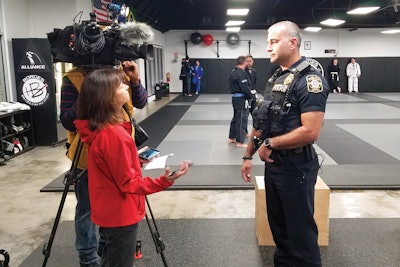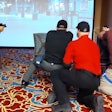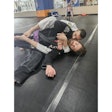 Jiu jitsu can be used as an effective technique for non-deadly force. This training is designed to reduce injuries to suspects as well as officers, and BJJ includes focusing on grappling techniques over striking.Photo: Marietta (GA) Police Department
Jiu jitsu can be used as an effective technique for non-deadly force. This training is designed to reduce injuries to suspects as well as officers, and BJJ includes focusing on grappling techniques over striking.Photo: Marietta (GA) Police Department
In a culture of intense scrutiny of police control techniques and accusations of brutality based off of cell phone videos, it is imperative that law enforcement trainers re-evaluate what they are teaching their officers. Punching people in the face and striking them with batons may be justified by a use-of-force policy in a given scenario, but the public perception may be totally different. They often see it as "lawful, but awful."
Brazilian jiu jitsu (BJJ) has been around for many years but has recently gained popularity with its proven effectiveness in combat sports. It has also expanded into law enforcement, and has proved to be an extremely effective way to control suspects in real-life applications. Thus, the acceptance of BJJ as a law enforcement use-of-force technique has continued its momentum and become the basis for many (elective) defensive tactics programs around the nation. Meanwhile, there has also a been a strong movement on social media, #bjjmakeitmandatory, where defensive tactics instructors are encouraging agencies to make BJJ a new standard of mandatory training for officers.
Grappling vs. Striking
The number one objective for officers is to go home safely at the end of their shifts. The number one objective for defensive tactics instructors is to teach officers how to accomplish that objective by using force when it is necessary and legally justified. However, the existing style of training does not escape backlash from the media when required force is used. Contrast that with BJJ, which is a form of grappling based on gross motor skills leverage and body positioning. BJJ teaches methods to control a suspect and restrain them in various positions, rather than striking them, which reduces the risk of injury to the suspect as well as to the officer. BJJ is more effective, can be taught to anyone, and looks better on camera to the public and media. Therefore, if BJJ training is made mandatory, the term "defensive tactics" could credibly be replaced with "control tactics."
Our agency, the Marietta (GA) Police Department, has been teaching limited BJJ techniques in-house for more than a decade. The training is made up of a mandatory four-hour session taught annually and augmented with open mat sessions offered monthly. The department's curriculum of in-service open mat and recruit training has morphed into mostly BJJ and less striking.
In recent years, this training has grown in popularity among our officers and many of them have begun BJJ training in outside gyms on their own time. However, our instructor staff believed this limited approach was not enough. The open mat sessions were having limited success due to schedules and logistics. The result was that the same few officers showed up each session. There is also the factor of available instructors capable of properly teaching BJJ techniques. Our instructors train at a local gym, Borges BJJ and Fitness, and their skills were limited to the education they had received. The certified instructors at the gym began offering law enforcement specific classes, which led to greater attendance from other MPD officers. The instructors explained that they felt sporadic and minimal (annual) training was not nearly as effective as it should be. They believed officers should train "a little a lot" throughout the year versus the existing "a lot a little" mentality.
 The Marietta (GA) Police Department staff created a short press release and social media posts about the agency's Brazilian Jiu Jitsu program. Local media reached out to the agency the same day to run positive news stories about it on television.Photo: Marietta (GA) Police Department
The Marietta (GA) Police Department staff created a short press release and social media posts about the agency's Brazilian Jiu Jitsu program. Local media reached out to the agency the same day to run positive news stories about it on television.Photo: Marietta (GA) Police Department
Most agencies train once a year on defensive tactics and then move on to the next required topic. Training on a regular basis is the key to becoming proficient. This viewpoint led to the desire to permanently incorporate BJJ mandatory training for all Marietta recruits before, during, and after the academy. The concept was that they would be required to attend weekly training up until the time they begin working the road. It turned out that the process of creating and implementing this new training policy was much easier than one might think.
Getting Command Support
The turning point for the MPD was when a command staff member, a major who is also a certified police instructor, decided to attend a training session with some of the officers during a scheduled defensive tactics session at a local BJJ gym.
That class was taught by the owner, Humberto "Beto" Borges, who is a BJJ third degree black belt. The major has been in law enforcement for more than 20 years, has never taken any martial arts in his entire life, and only attended the minimum defensive tactics training each year. He was impressed by the practicality of the training and how the grappling technique specifically applied to law enforcement.
After that first session, he joined the gym and started taking night classes three to four days a week. He was quickly impressed that size, strength, and fitness level were not important to the technique. His question became: "Why hasn't law enforcement adopted this training sooner?" Being a member of the command staff, he had a firm grasp on changing trends in society and what the public deems acceptable for use of force. He pointed out to the defensive tactics instructors that most people agree average citizens do not like to see law enforcement punch violators, whether it is justified or not. One can search the internet and find video after video of officers legally and justly striking a violator trying to gain control and hear the crowd screaming at the officer for delivering these strikes. To attempt to combat this preemptively, he collaborated with the MPD training staff and decided to move forward with a proposal to make BJJ training mandatory in our department for all new officers. Now it was time to develop a game plan.
The Program
In order to convince the rest of the command staff to consider adopting the program, it was immediately clear it needed to be reasonable, sustainable, and affordable. If any of the three factors were missing, the program would fail.
Certainly the department could tell our instructors to offer more BJJ classes or have additional open mat sessions, but only a few of the dedicated officers would attend and it would put an unnecessary burden on our instructors. By going outside the agency for instruction, we could train with BJJ experts at varying hours, providing flexibility without putting new additional pressure on our own instructors.
The gym we ultimately chose offered nine classes a week during the morning, afternoon, and evening. This schedule gave officers considerable flexibility on when they could attend. With four nighttime classes being offered weekly, the recruits could attend at least one session after their daytime academy training and there were even Saturday morning no-gi (training garment) classes they could attend. So, two out of three main issues, reasonable and sustainable, were immediately achieved by choosing a creditable local BJJ gym.
As to the affordability aspect; without getting too far in the weeds, every gym has a "drop-in" or daily rate. We negotiated with the gym a lower rate that the department's training budget could afford. In addition, the department purchased multiple gis from the gym so each recruit would be issued their own gi and must be personally responsible for it while in the five-month program. The gis last for years and can be easily passed from one recruit to the next.
Our monthly gym bill for the training and the gis is in the hundreds of dollars each month; well below the typical thousand-dollar mark. We average between four and 10 recruits in the program at a time, so the monthly bill fluctuates. Our proposal to training MPD recruits in the best martial art for law enforcement for a few hundred dollars a month was an easy sell.
The First Seven
Our first group of recruits that completed the entire five months was a diverse collection of six males and one female. Only two had taken martial arts in the past. A third was a wrestler in high school and the other four had never received any formal training. In the first week the recruits joined the department, they were required to attend training and continue every week for the next five months. This group completed a total of 159 classes over the five-month period with zero injuries.
Upon completion of the classes, we asked these seven officers to answer a set of blind survey questions. The questions covered if we should continue this program, what they had learned, and whether the mandatory once-a-week training session was enough. All seven agreed this program should stay and that the mandatory, one training day a week with a maximum of three times per week was appropriate. All the recruits had weeks where they attended three sessions and alternately "off" weeks where they only made it to one. The recruits said they were more prepared for their academy training, had developed more self-confidence, and felt they now had the necessary training to apprehend resistant suspects. Several made comments that they had never been in a "fight" before and now felt confident in their fighting abilities, expressly since our gym allows students to "spar" or in BJJ terms "roll."
We now have several groups attending and a constant in and out flow of officers in the program, but 30% of the officers have continued training after the five-month period ended and are willing to pay out of pocket to continue their personal training.
Alerting the Media
Finally, the Marietta PD staff prepared a relatively short press release and created social media posts about the program attended by seven graduating recruits. These short releases spun up in local news media that day. It appears we hit a nerve (in a good way) with the public and it is obvious everyone is hungry to see law enforcement training evolve. It was also apparent the media keyed in on the fact that this training is designed to reduce injuries to suspects as well as officers, and BJJ includes focusing on grappling techniques over striking.
However, at no time did we say that striking was being removed from our use of force. What we did say is that we are focusing more on grappling control techniques instead.
Jiu jitsu can be translated as "gentle art" and it can be used as an effective technique for non-deadly force. In short, we are training officers in the gentle art of controlling violators. It resonates as an advancement with both the general public and today's police recruits as well. While it will always be necessary for the police to use both non-deadly and deadly force, the police should never stop working to improve use of force methods and techniques to meet the standards of our changing society. Incorporating BJJ is just such an advancement.
We genuinely hope this article will serve as motivation and a blueprint for other agencies to send their officers to a BJJ school outside of their agency. The cost and risk associated are minimal compared to what the department and community will gain and will additionally make in-service and open mat training with departmental instructors increasingly more valuable.
Sgt. Clay Culpepper is a defensive tactics and firearms instructor with the Marietta (GA) Police Department. He is also an IALEFI instructor.
Major Jake King currently serves as Marietta (GA) Police Department's SWAT commander and oversees the day watch uniform patrol and specialized units. He is also an IALEFI instructor.















